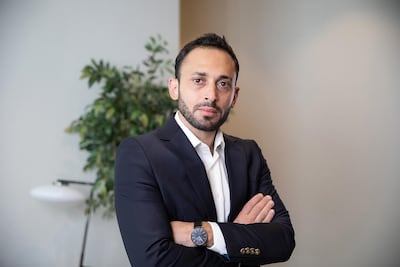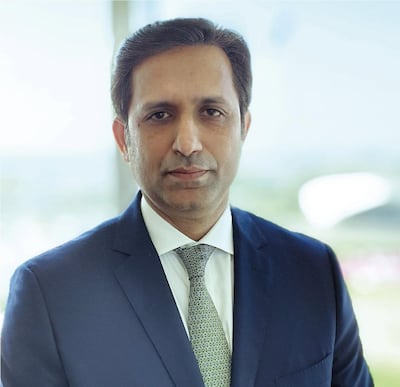The cost of raising a child has never been higher, with their day-to-day needs adding up to include everything from housing to food to clothing, healthcare, childcare and transportation. When you add in education, the financial responsibilities can be overwhelming for some parents – particularly if there is more than one child to consider.
Financial experts say it's never too early to start saving for your child's future, whether it's for university or even helping to set them up for financial success as adults.
A majority of parents in the UAE allocate a significant portion of their long-term savings towards their child’s education, according to the National Bonds Savings Index 2019 report. Up to 70 per cent of UAE residents save for the long term, of which 52 per cent factor in savings for their children’s education, the report says.
However, according to a 2017 survey by HSBC, 68 per cent of parents in the UAE are funding their child's education from their day-to-day income, while 34 per cent are using general savings, investments or insurance.
About 53 per cent of parents surveyed by HSBC wished they had started saving earlier, 48 per cent hoped they had put more money aside for their child’s education, while 23 per cent expressed a desire to have taken professional financial advice. Fifty-three per cent of millennial parents wished they had started saving earlier, compared with 45 per cent of baby boomer parents.
The HSBC report adds that parents see their children’s education as an essential investment for their future, but it can be costly. On average, parents in the UAE spend about $99,378 on their child’s primary, secondary and tertiary education up to undergraduate level, according to the survey.
“The sooner they start investing, the better, as it allows the power of compounding to work in their favour,” says Stuart Ritchie, director of wealth advice at financial planner AES International.
“Involve children in the investment process when they are old enough so they can understand the value of putting aside money every month. It can be a great way to teach children about money and can go a long way to creating better financial habits,” recommends Mr Ritchie.
Most financial advisers recommend parents invest passively in a diversified portfolio of low-cost exchange-traded funds through a regulated company.

“It will be better if the companies offer an online platform so the clients can open a virtual account and have full transparency. Moreover, they can have access to the fund whenever they need it without any restrictions,” says Bilal Majbour, founder and chief executive of Wealthface, an online investment platform.
He adds that options to invest for a child’s education used to be limited to mutual funds and savings plans. However, both products cost much more than investing in a portfolio of ETFs and are illiquid. “For example, if a client wants to withdraw his money before a certain time, they will lose a big portion of their investment,” cautions Mr Majbour.
Mr Ritchie recommends that parents saving for their children invest in low-cost index funds. He cites numerous do-it-yourself platforms that can be used by parents to get their children interested in investing from an early age.
Invested in three asset classes for a 1-year-old infant
Devesh Mamtani, a chief marketing strategist with a Dubai-based financial consultancy, and his wife Kakul started planning for their daughter Devika’s future even before she was born.
Devika might be just one year old, but her parents have already invested in four different products to secure her future and education expenses.
“We have opted for a systematic investment plan through the SPDR S&P 500 ETF, which is an exchange-traded fund that tracks the S&P 500, a flagship index of 500 top US companies such as Apple and Microsoft,” says Mr Mamtani. He adds that this index has given on average 10 per cent annual returns for the past 15 years.
The couple has a 15-year investment horizon for the funds allocated to this ETF and plan to withdraw the funds in 18 years for their daughter’s college education and future needs.
Mr Mamtani and his wife have also invested in local bonds issued by the UAE government, which offer up to 5 per cent annualised returns. "They aren't risky because they are government-backed," he tells The National.
Devika’s parents also set aside money every month in two recurring deposits with local banks. Even though the children’s savings accounts are low yielding, they provide safety and liquidity for immediate requirements.
“Because I started financial planning before my daughter was born, the yield offered then is better than what’s prevailing now,” says the Indian who saves 40 per cent of his monthly income for his daughter’s future.
He has assigned a weightage of 25 per cent for recurring deposits, 35 per cent for bonds and 40 per cent for the SIP and ETF in the investment portfolio for his daughter.
Although education costs typically grow by three to four per cent every year, Mr Mamtani is confident that the growth in the S&P 500 ETF and local bonds will provide the family with at least 70 to 80 per cent of expenses for Devika’s college and future needs when she turns 18.
He advises other parents to consider investing in the S&P 500 ETF or purchase a systematic investment plan, where they can invest a small amount every month instead of a lump sum upfront. He also recommends SIPs in gold as well as mutual funds for children’s education.
SIPs are a low-risk method for investment, Mr Mamtani says, adding that he has adopted a medium-risk approach for his daughter’s investment portfolio.

Other asset classes to consider
Parents in the UAE can also consider taking out an Education Plan from National Bonds, which offers structured monthly instalments. For instance, if you have a 10-year plan and wish to save Dh200,000, you save Dh1,787 every month and walk away with Dh239,000 at the end of the 10-year tenure (amount includes expected profit and bonuses), according to National Bonds.
“As time passes quickly, we urge parents to secure their children’s education by taking action now to give them peace of mind,” says Saqib Mahmood, chief commercial officer of National Bonds.
The Education Plan also offers annual profits and an additional 1 per cent incremental bonus that could go up to 10 per cent, calculated on the holder’s cumulative average contribution. The distribution of a bonus and profits is done by issuing regular savings bonds, allowing parents to enjoy the perks of savings bonds as well, Mr Mahmood says.
The plan is flexible with easy entry and exit points. It also comes with takaful (insurance) coverage, a scheme of reimbursement or repayment in case of death of the guardian, organised as a Sharia-compliant cover provided by a local takaful company.
“Our takaful coverage ensures educational continuity for your child in case of either of two scenarios affecting the parent/guardian of the child, including death due to any cause as per takaful terms and conditions, or permanent total disability. Should the policyholder suffer from either of the above, the declared annual school fees or the university/college costs will be paid for the remaining term,” adds Mr Mahmood.
The premium payment is only required for up to 50 per cent of the takaful term, after which it is free. “For instance, if you have availed of a 10-year plan, you only have to pay for the first five years. The global life and PTD cover until the end of the plan, while premium payment is required for only up to 50 per cent of the takaful term, but offers full cover until plan completion,” the CCO explains.

Reasons for investment
The main reason parents choose to save for their child is to ensure they go to college. However, it could also vary depending on each family.
“How the children use this money is often up to them. However, they tend to go towards buying family homes or boosting their retirement funds,” says Mr Ritchie.
“Parents invest for their children in order to set them up for their future or give them a head start in life and because systematic, low-cost investing will always give better returns over the long run than say, opening up a regular savings account,” he adds.
Meanwhile, Mr Majbour says the money saved for a child's future can also be used as seed capital for a business if they wish to become entrepreneurs.
Tips for investing for your children
Most financial advisers recommend passive investments and suggest that parents invest in a basket of ETFs for their child’s education plan because fees are lower and returns higher than mutual funds. Parents can also easily open an ETF account online through a number of FinTech platforms.
“Ensure that the chosen company is regulated by the Central Bank of the UAE, the Abu Dhabi Global Market or the Dubai International Financial Centre,” says Mr Majbour.
He also suggests that when choosing a financial adviser, parents must be careful to select one who acts in their best interests as a fiduciary.
“A fiduciary does not charge any commission but only an annual fixed fee, so there is no intention to sell you products just to generate more money,” the Wealthface founder says.


